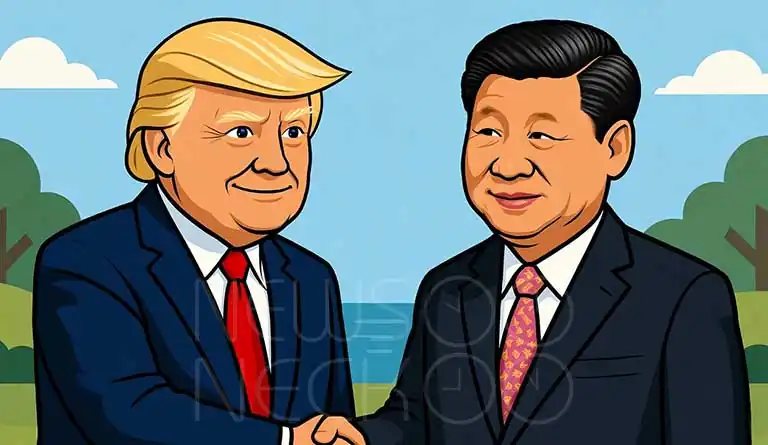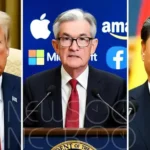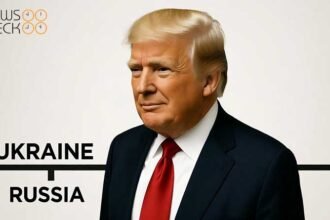A Historic Deal That Could Transform Global Trade and Your Smartphone
When two of the world’s most powerful leaders sat down for talks in South Korea, nobody expected the meeting would send shockwaves through the stock market within hours. But that’s exactly what happened on Thursday morning, when mining company shares suddenly jumped, leaving investors scrambling to understand why.
The story begins with a simple handshake between President Donald Trump and Chinese leader Xi Jinping. What seemed like another diplomatic gathering turned into something far more significant. Behind closed doors, these two men reached an understanding that could reshape how technology reaches your hands.
What Just Happened?
Picture this: You wake up Thursday morning, check your phone, and see that certain mining companies have suddenly become much more valuable overnight. Critical Metals shot up nearly seven percent before markets even opened. USA Rare Earth climbed six percent. Energy Fuels gained three percent, while both MP Materials and NioCorp Developments saw similar jumps.
Why would mining stocks suddenly become so exciting? The answer lies in something most people have never heard of rare earth elements.
The Mystery Minerals in Your Pocket
Right now, you’re probably holding a smartphone, sitting near a laptop, or reading this on a tablet. Inside these devices are special materials that make them work. Scientists call them rare earth elements seventeen unique minerals from the periodic table that possess almost magical properties.
These aren’t ordinary rocks. Their atomic structure gives them magnetic abilities that engineers need for everything from electric car motors to military defense systems. They power the robotics in factories and make your phone vibrate when someone calls.
Here’s the surprising part: most Americans don’t realize that nearly everything electronic they touch depends on these materials coming from one country China.
You Must read it: Trump & Xi in Final Push to Save U.S. China Trade Truce
China’s Iron Grip on Technology’s Building Blocks
Imagine if one bakery made seventy percent of all bread in the world, and that same bakery also processed ninety percent of wheat grown everywhere else. That bakery would have incredible power over breakfast tables globally.
This is essentially China’s position with rare earth elements. The Asian giant doesn’t just dig these minerals from its own ground it processes materials mined in other countries too, turning raw ore into usable components that factories worldwide need desperately.
American officials have worried about this situation for years. As the world shifts toward cleaner energy and electric vehicles, demand for these special elements keeps growing. But relying on one nation for such critical materials creates vulnerability.
The Threat That Made Everyone Nervous
Back in October, China made an announcement that sent chills through boardrooms in Detroit, Silicon Valley, and Washington. Beijing warned it might tighten controls on exporting rare earth materials and related technologies. Chinese officials said they wanted to prevent these minerals from being “misused” in military applications and sensitive industries.
For American manufacturers, this threat felt like someone threatening to turn off the water supply. Without steady access to rare earths, production lines could slow or stop entirely.
China had already imposed some restrictions in April, which remained in effect. But the October announcement suggested even stricter measures might be coming.
You Might Like it: Trump threatens 100% tariffs on China, American farmers Caught in Crossfire
A Meeting Changes Everything
When Trump and Xi met in South Korea, rare earths became a major talking point. According to Trump, who spoke with reporters aboard Air Force One afterward, the discussion went remarkably well. He described it as an “amazing meeting” and announced that the “rare earth issue has been settled.”
The agreement reached between Washington and Beijing includes multiple components. China agreed to postpone introducing additional export controls for one full year. This delay came as part of a larger package where Trump’s administration also reduced certain tariffs linked to fentanyl concerns.
But perhaps most importantly, Trump told journalists that his team expects China to keep extending these delays regularly, not just once.
What This Means for Ordinary Americans
You might wonder why you should care about minerals with complicated names and diplomatic meetings in faraway countries. The answer is simple: these materials are everywhere in your daily life.
That electric car your neighbor drives? Packed with rare earths. The wind turbines generating clean electricity? They need these elements too. Your phone’s camera, your computer’s hard drive, even certain medical equipment all depend on steady supplies of these special minerals.
When stocks of American rare earth mining companies jump, it signals investor confidence that domestic production might expand. If U.S. companies can mine and process more rare earths locally, America becomes less dependent on imports. This could mean more stable prices and reliable supply chains for manufacturers.
Previous Restrictions Remain
While the news brings relief, it’s important to understand that not all restrictions disappeared. The export controls China announced back in April are still active. Only the additional measures threatened in October received the one year postponement.
Industry experts are watching carefully to see whether Trump’s prediction about routine extensions proves accurate. One year sounds like a long time, but in the mining and manufacturing world, building new facilities and establishing supply chains takes much longer.
Looking Forward
This agreement represents more than just trade policy it shows how economic interdependence between nations creates both challenges and opportunities for cooperation. When done right, such deals can benefit workers, companies, and consumers across multiple countries.
For now, investors are celebrating. Mining companies see opportunity ahead. And somewhere in a factory, engineers are breathing easier knowing their supply lines remain stable at least for another year.
Author: Yasir Khan
Date: 30 Oct, 2025
For More Updates, Visit Newsneck













